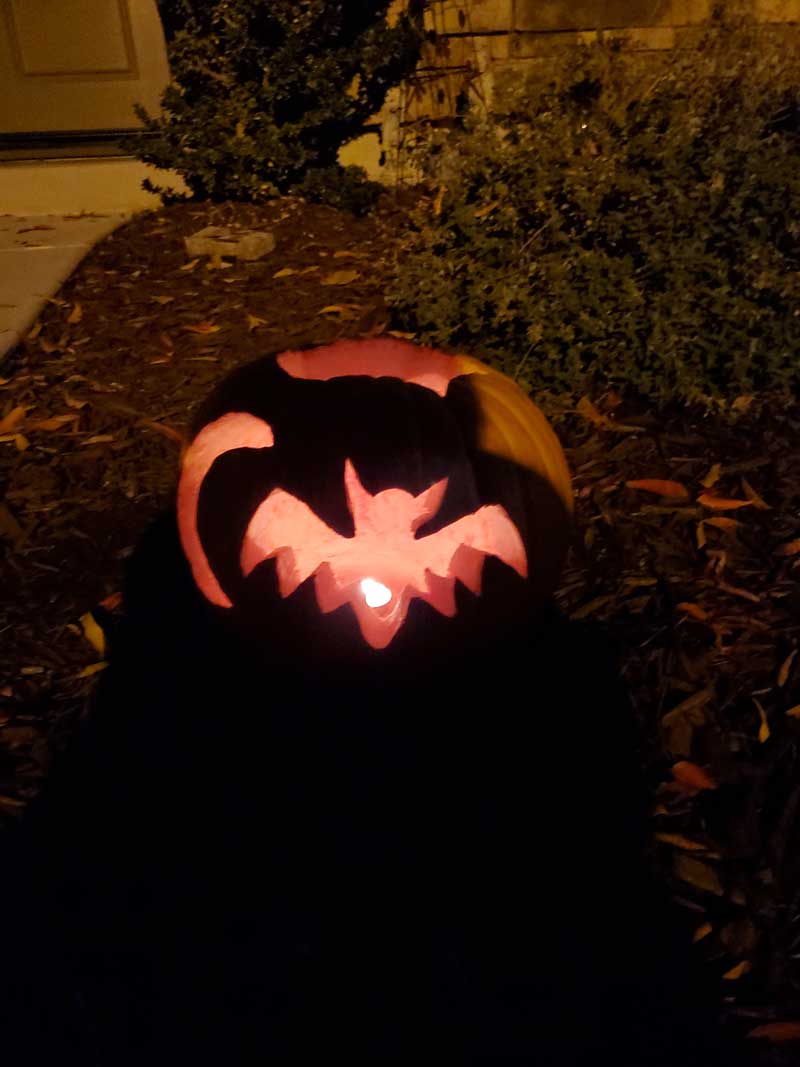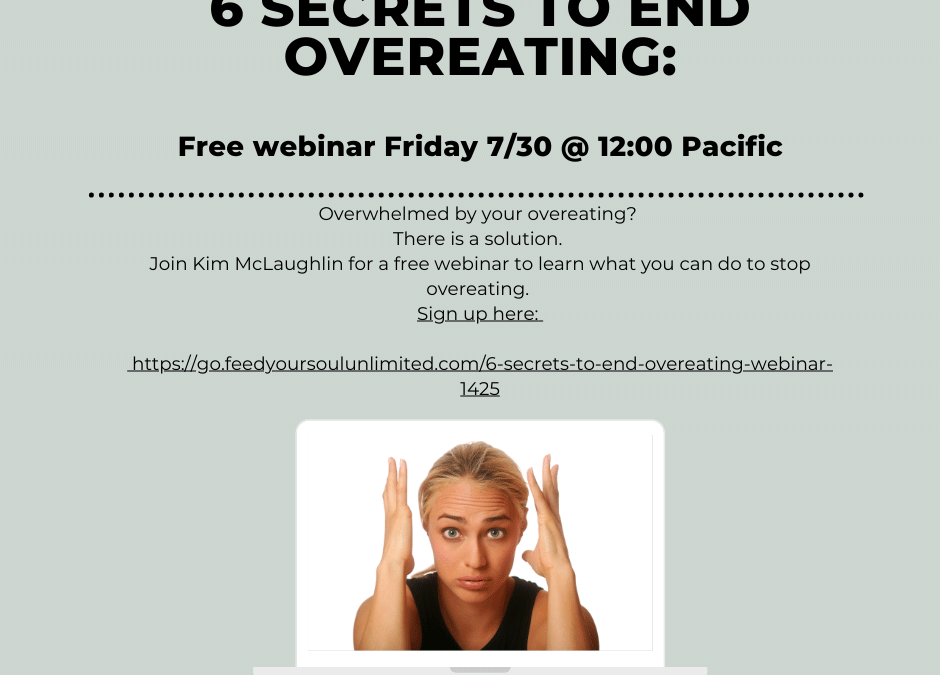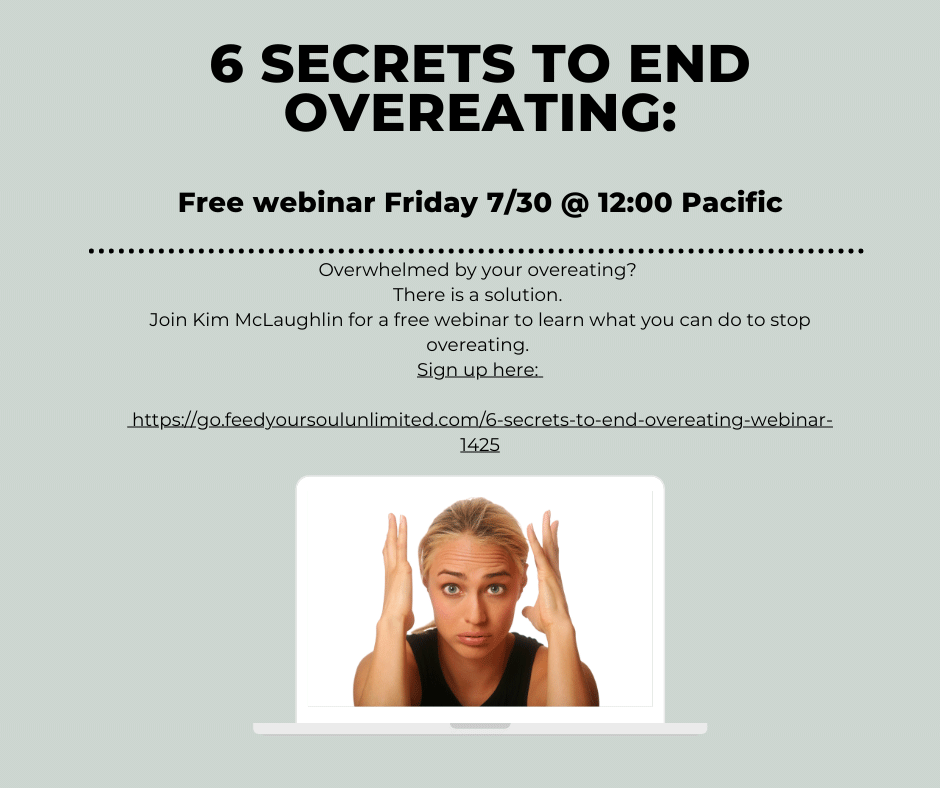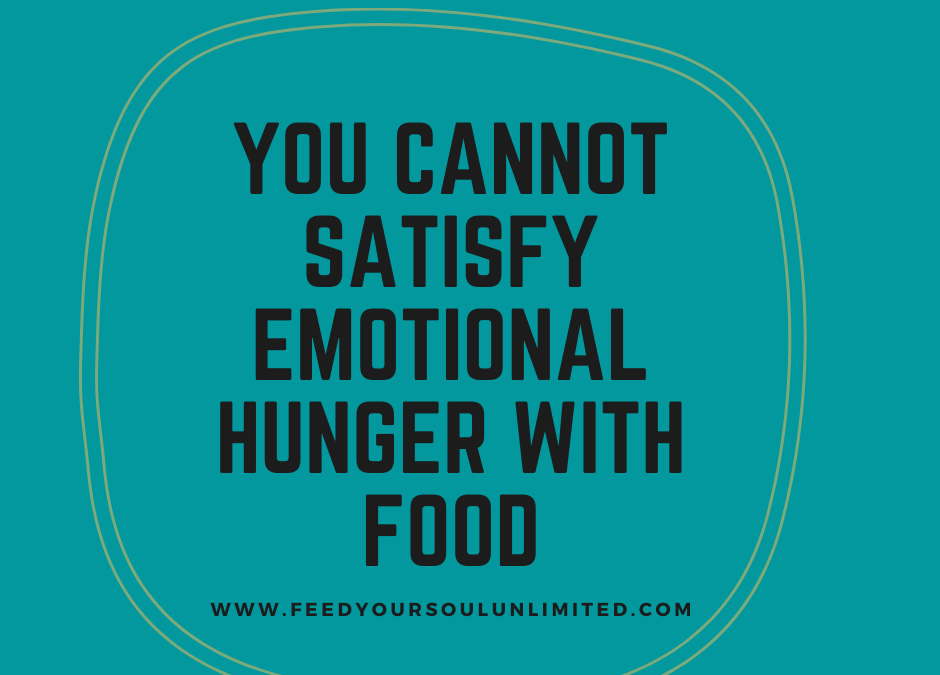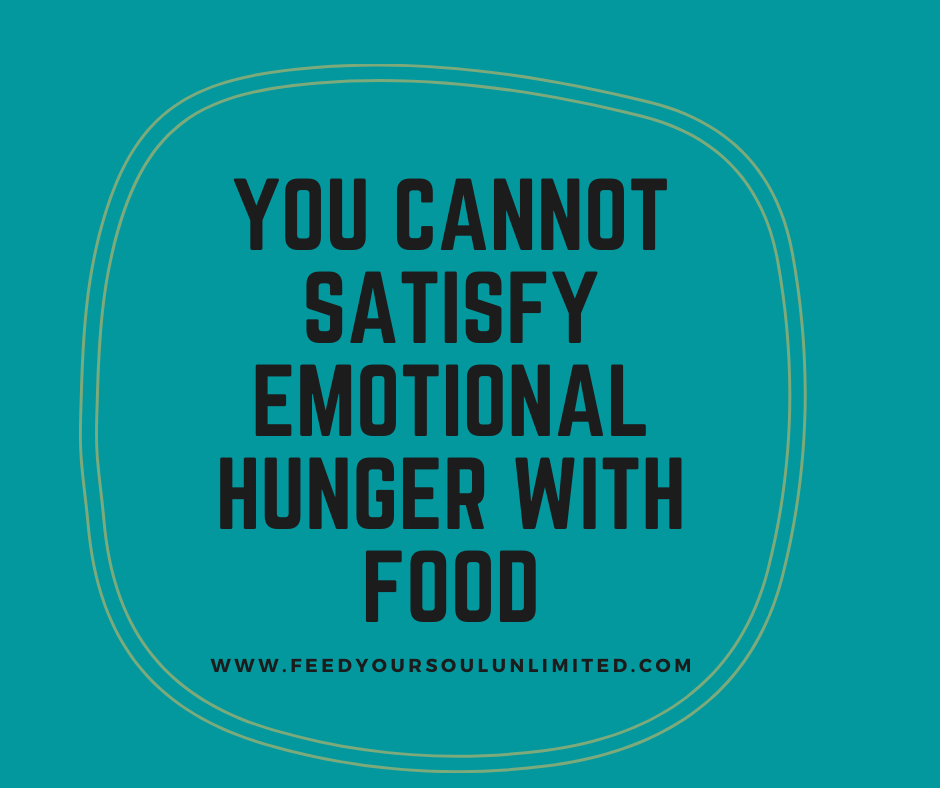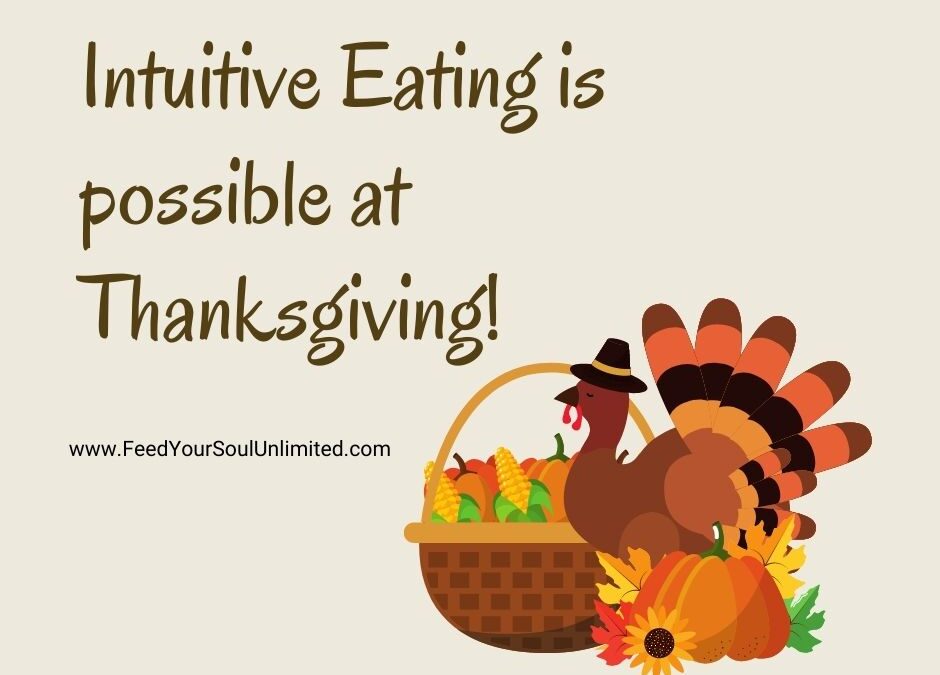
Intuitive Eating at Thanksgiving
Can you be an intuitive eater at Thanksgiving?
It can seem like an oxymoron to say you are being an intuitive eater at Thanksgiving because they don’t really seem to go together.
Doesn’t seem like if you’re going to talk about Thanksgiving, it’s about overeating, about having a lot of different foods and about binging. When we talk about intuitive eating, that’s about becoming more in touch with your body and what your body needs.
I don’t think intuitive eating and Thanksgiving are talked about enough.
I have learned that after years of being an intuitive eater, and helping other intuitive eaters, I know it is possible. And I know that it works at Thanksgiving, because I’ve done it myself and my clients have done it also.
I call this time of year the Holiday trifecta, which is the time between October 1 and December 31 when there are many different holidays. This is really the time of year where people are encouraged to binge and to overeat. And we really give ourselves a pass on eating intuitively. I’m okay if you want to overeat. That’s fine.
If you do want to overeat, consider if it is coming from the backlash from the diet mindset, right? I have talked about this often on the Feed Your Soul with Kim Podcast and in my blog: that the diet mindset (the dieting and restricting) leads us to binging, at certain times. I think this is what actually leads us to binge over the holidays and then we restrict throughout the year.
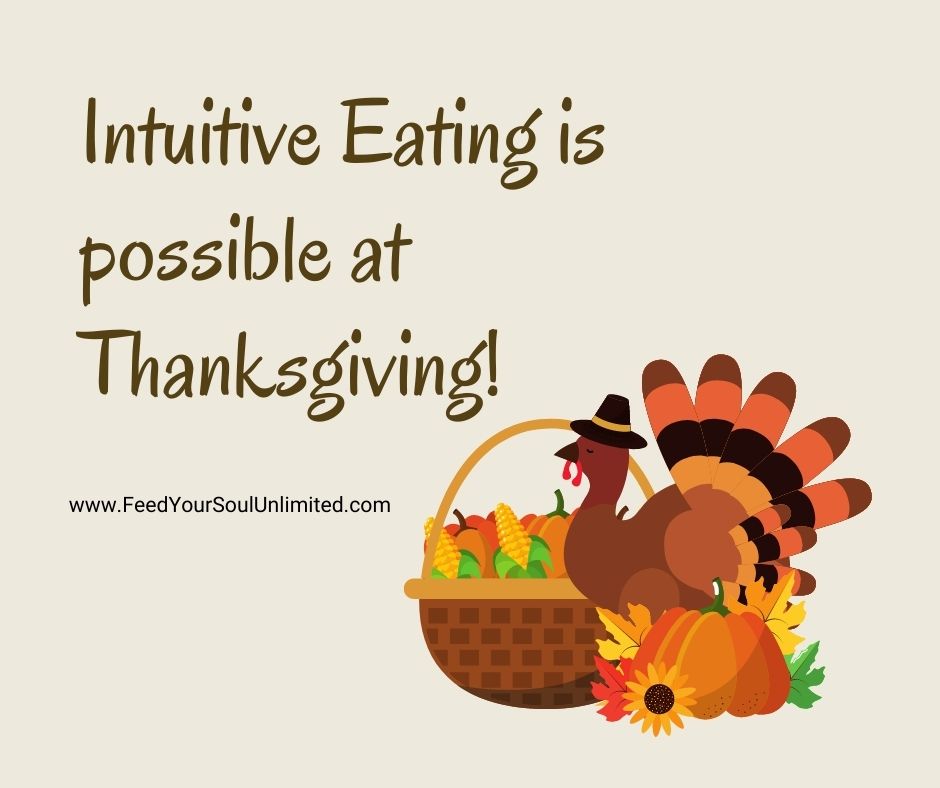

Binging over the holidays is socially acceptable, as long as you plan to diet in January. It’s this never-ending cycle. I want to wonder with you if you could plan to eat intuitively 365 days a year? Eating on Thanksgiving is no different than eating on February 3rd, right? They’re not different. And we could come to the table like literally and figuratively in the same way through using intuitive eating all throughout the year.
Over the holidays, marketers create a feast or famine mindset with holiday foods!
I find this time of year is really challenging, because we’re really met with the idea of special foods. Those foods that only come out during the holiday time. And they’re available only for a limited time. They’re special and you can’t get them at any other time of the year.
Starbucks is great at this. They’re great about having the pumpkin spice latte that comes out on a certain day and lasts for a limited time. There’s this limited time where you can get it and that’s just like restriction. Throughout the whole year we cannot get pumpkin spice latte (it is like a restriction) and we know it will end soon, so we look forward to it and go crazy over it, because it’s in such limited supply.
This is where marketing does that kind of feast and famine idea. And then we buy more of it!
I also became aware of this binge/restrict idea over the holidays when I thought about the foods that we have at Thanksgiving time. I thought about and realized that I literally could have any of those items in that holiday meal anytime throughout the year.
I wonder for you, if you allowed yourself to have these foods at any time of the year, if they felt like they were something that wasn’t special, but that were regular. If you wanted it, I tend to not have the holiday foods the other time of the year because I just make other choices.
Intuitive Eating means food is not restricted and I can have what I want.
I don’t need to restrict all year, and then binge at the holiday time. It is the dieting mindset (I need to restrict) that can lead you binge over the holidays.
Consider the concept of habituation, which is when you have full free access to foods that you want: you are not denied foods. This is what happens around Halloween and candy. If you have access to candy throughout the year, Halloween doesn’t become that big of a deal. When you have the food in your regular rotation as what you can just have, it’s just food that you have. It doesn’t feel like you’ve been restricted during the other part of the year. Habituation is one way to get out of that dieting mindset.
The messages about binging are so pronounced this time of year. It is constantly in our faces about having this food, about how special it is, and how you should just eat. If you want it eat it. That is fine. Just recognize that when we intuitively eat, there is always the opportunity to eat what we want.
The idea of overeating at the holidays is ingrained in our society.
I just want you to be aware that its part of our society and kind of we made the decision to jump into that mindset and to be a part of it. And I’m saying there is a way to jump out of it.
Some ideas that are ingrained in our society are:
- We should exercise heavily on Thanksgiving, so then we can have permission to overeat later in the day. This comes from the mindset that we have to punish ourselves with exercise, so that we can eat more later on in the day.
- A long time ago, when I would go to weight loss programs, I remember going quite a few times at Thanksgiving time and we’d be given a paper plate. We were supposed to plan out what we would have on the plate on Thanksgiving. We’d be told the number value to each of the foods (points, calories, macros, etc.). You would then pick all the foods that you wanted, and you’d write it on your plate and write the number value equal to what you were allowed to have on that day. Then that was what you were going to eat for your holiday meal. I was planning what I would have on Thanksgiving days/weeks before it was even that day. Truthfully, I do not know what I really want until the day of. It was expected you would eat the items and amount that was written on your plate, and then you’d stop. Then you were expected to just stop without any real way of making that happen. Or reason why. It was not based on hunger or satiety, just on what number value you were allowed to eat.
- I also know people will not eat to have the super large Thanksgiving meal. This is restricting to overeat. This is part of the dieting mindset. If you do this consider what you’re doing and notice how it set you up for failure.
- Another thing that happens over the holiday is overeating your favorite foods, because it’s the only day you’re going to have it. Telling yourself, I’m going to really go all in because this is the only day, I’m going to have this food. Well, like I said earlier, really this food, at least in the United States is available all the time. Really think about if it’s this one special food, and you want to have it other days of the year, have it other days of the year. That’s what Intuitive Eating is all about.
- Overeat on Thanksgiving Day and expect to be physically uncomfortable. I know of people who overeat at Thanksgiving knowing they will be sick. They have pills or supplements available to curb the upset stomach. Ask yourself, why am I eating foods that make me sick or eating quantities that make you sick. This is another place where Intuitive Eating is so helpful. We believe you should eat what you want and eat until you’re satisfied.
- I have learned many low calorie, low fat and not tasty foods. You make the version of the item to be low calorie, low fat. It was never the tasty version of it. You’re eating something that really isn’t as satisfying. Intuitive Eating says to eat what you like, eat what tastes good.
How can you be more intuitive at the holiday meals? Here are some things I do:
First, my family choses to be active on Thanksgiving. Our family has a tradition to do a local turkey trot, because it’s fun, people dress in fun clothing and a great community gathering. If we’re not able to do that, we’ll go take a long walk on Thanksgiving. We don’t do it to burn calories. We do it because it feels good.
Second, I eat my regular meals, at regular times, just like normal. The Thanksgiving meal is one meal of the day, I don’t come to the table starving. I don’t come with expectations of eating a whole lot or eating a little. I come to the table with expectations of putting a reasonable portion on my plate, the amount that I want and the food that I want. I’ll tell myself that if I want to have more, I can go back and get more. And what I find is now that I’ve been doing intuitive eating for quite a few years, is that I’m pretty good on what my portion size is, and I don’t need to go back for more. But I don’t have this internal obsession about having more food.
Third, I pay attention to my hunger cues and eat when hungry. I also notice my satiety cues (fullness) and stop when full. I scan my body and start noticing how hungry am I? Do I want more food is my body needing more food, what might be my right kind of food? I don’t want to eat in a way that’s going to make me feel sick.
Lastly, I pay attention to my emotions. Emotions are one of the six components of feeding your soul. I always make my mental plan about how I will take care of myself emotionally throughout Thanksgiving. I put together my plan of what I need to do to take care of myself. If I feel overwhelmed or a little bit overloaded with people or with what’s going on, I tend to I might take a walk, go talk to different groups of people, or changing the subject helps me a lot. Taking a deep breath helps me emotionally. I have ideas of what I can do emotionally, so that I just feel really calm and centered throughout the whole event.
Consider is what you might need for the holiday this year. If you were going to enter the into this in more of an intuitive eating kind of wait, what might you do? You could try one of my ideas or use some of your own. I encourage you to consider them and make your plan in advance for how you can be more of an intuitive eater during this time of year. It is always my goal to have peace around food and peace in our lives because that it just feels better that way. I encourage you to try intuitive eating this year and see how it can work for you.
(Note: you can listen to this blog on the Feed Your Soul with Kim podcast)
Kim McLaughlin, MA is a Counselor, Speaker, Podcaster, and Inspirational Coach who specializes in working with people who suffer from binge eating and emotional eating. She is a Certified Intuitive Eating Counselor.
Ready to make changes in your life and with food? Sign up for Emotional Eating Solutions 8-week Self Study Course here.
Determine if you are an Emotional Eater by signing up for the free Am I an Emotional Eater Quiz at https://kimmclaughlin.influencersoft.com/FYSU-EE
You can find Kim on her podcast Feed Your Soul with Kim and you can find it on all podcast platforms.
Kim is the author of the book Feed Your Soul Nourish Your Life! A Six Step System to Peace with Food and the Amazon #1 Best Selling book Discovery Your Inspiration.


